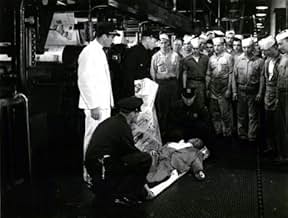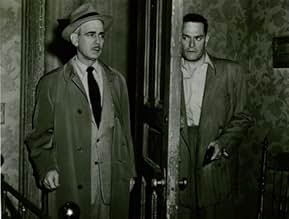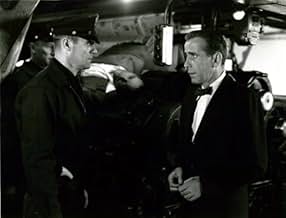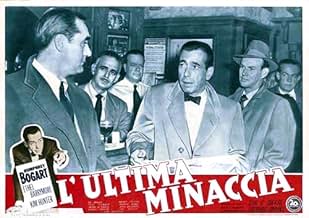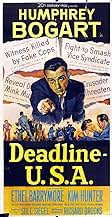IMDb-BEWERTUNG
7,2/10
4594
IHRE BEWERTUNG
Obwohl seine Zeitung kurz vor dem Verkauf steht, versucht der kämpferische Redakteur Ed Hutcheson, einen Enthüllungsbericht über den Gangster Rienzi fertigzustellen.Obwohl seine Zeitung kurz vor dem Verkauf steht, versucht der kämpferische Redakteur Ed Hutcheson, einen Enthüllungsbericht über den Gangster Rienzi fertigzustellen.Obwohl seine Zeitung kurz vor dem Verkauf steht, versucht der kämpferische Redakteur Ed Hutcheson, einen Enthüllungsbericht über den Gangster Rienzi fertigzustellen.
- Auszeichnungen
- 2 wins total
Joe De Santis
- Herman Schmidt
- (as Joseph De Santis)
Parley Baer
- Headwaiter
- (Nicht genannt)
Bill Baldwin
- Man Asking for Ed Hutcheson
- (Nicht genannt)
Willis Bouchey
- Henry
- (Nicht genannt)
Lovyss Bradley
- Woman
- (Nicht genannt)
John Brooks
- Reporter
- (Nicht genannt)
Ralph Brooks
- Newspaperman
- (Nicht genannt)
Empfohlene Bewertungen
I don't know if it was intended to copy the fast-paced press room and gangster films that Warner Brothers did in the 1930's, but you certainly get a chance to see what Bogart could have done had he been a star at Warner Brothers during the 30's rather than largely a supporting player. Of course, everything here is taking place in present day - 1952 - but not only does the film reach backwards for its brisk pace, it reaches forward into the 21st century with some of its subject matter. In particular, there is the subject of how big companies buy smaller more effective companies to eliminate the competition, and the subject of inherited wealth and how the companies that formed that wealth are often not appreciated by the spoiled children-heirs.
Here Bogart plays the editor in chief of crusading hard-hitting daily newspaper "The Day", which is about to be sold off by the bored children of the deceased founder. The founder's widow (Ethel Barrymore) unfortunately is outvoted by her ungrateful children, and with the encouragement of Bogart's character tries to come up with enough money to buy her children's shares back from her daughters. In parallel with this is the story of The Day trying to break one last big story before they are bought out - a story that will break the power of a local crime boss who is not taking his possible downfall lying down.
This one is seldom seen and very well done, and I highly recommend that you see it if it ever comes your way.
Here Bogart plays the editor in chief of crusading hard-hitting daily newspaper "The Day", which is about to be sold off by the bored children of the deceased founder. The founder's widow (Ethel Barrymore) unfortunately is outvoted by her ungrateful children, and with the encouragement of Bogart's character tries to come up with enough money to buy her children's shares back from her daughters. In parallel with this is the story of The Day trying to break one last big story before they are bought out - a story that will break the power of a local crime boss who is not taking his possible downfall lying down.
This one is seldom seen and very well done, and I highly recommend that you see it if it ever comes your way.
"It's not our job to prove he's guilty. We're not detectives and we're not in the crusading business." That line from Humphrey Bogart early in the film lets you know you're watching a movie about a bygone era in journalism. Or maybe that's just an idealized fantasy and reporters were never like that, because later in the film Bogart contradicts himself by instructing his reporters to "go below the belt" and "we're gonna convict him of every crime on the books." Feelings on journalistic philosophy aside, this is an exceptional crime drama about the goings-on at a newspaper that's going out of business. Before the doors are closed, editor Bogart and his reporters try to uncover the truth about a racketeer's criminal activities.
Bogart turns in one of his finest acting turns, with terrific support from Ethel Barrymore, Martin Gabel, Ed Begley, Kim Hunter, Warren Stevens, Jim Backus, and many more. The story moves along at a smooth pace and keeps your interest throughout. There's quite a bit of monologuing but the script is packed with punch and grit. It's one of the better films in writer & director Richard Brook's career. It's worth a look on its merits as a dramatic film, as well as the added historic value it has for those looking to examine the differences and similarities between how journalism was viewed yesterday versus today.
Bogart turns in one of his finest acting turns, with terrific support from Ethel Barrymore, Martin Gabel, Ed Begley, Kim Hunter, Warren Stevens, Jim Backus, and many more. The story moves along at a smooth pace and keeps your interest throughout. There's quite a bit of monologuing but the script is packed with punch and grit. It's one of the better films in writer & director Richard Brook's career. It's worth a look on its merits as a dramatic film, as well as the added historic value it has for those looking to examine the differences and similarities between how journalism was viewed yesterday versus today.
The 40's and 50's had quite a few movies in which newspapers and newspapermen were the central focus. There was "Scandal Sheet," "Ace in the Hole," "It Happened Tomorrow," "Foreign Correspondent," "His Girl Friday," this movie, and others. I suppose it makes sense considering print media was the largest and most influential form of media with television a decade or so away from becoming the ubiquitous medium it is now.
Ed Hutcheson (Humphrey Bogart) was the editor of The Day, a thriving New York newspaper. The owner and founder had just died and The Day was being sold by the wife and the two daughters. Ed was giving it his all trying to do what he could to prevent the sale as well as continue to print relevant news. He dedicated all of his staff and resources to looking into a local mobster named Tomas Rienzi (Martin Gabel) when one of his reporters was hospitalized for digging up too much information on the same gangster. He thought maybe, just maybe, this story would both: expose a criminal and save the paper.
This was an ideologue movie. There were two stories running parallel to each other. One was the story of the gangster and his outsized influence, the other was the newspaper being sold to a competitor who was going to shutter it. The gangster story was a thrilling one, but the paper being sold was a principled one.
If The Day was sold to a competitor and then closed down, that would be one less voice for the people. It would be one less viewpoint, one less source of news, and one less competitor for the other papers. Such a thing couldn't be good for the reader and the average citizen. Market competition has always benefited the consumer (even though it's not benefiting us much nowadays with gas prices) while monopolies have always harmed the consumer.
This was a pivotal issue with The Day being sold, but it also directly confronted a person's or business's capitalistic right to sell their property. Should the courts prevent this sale based upon it taking away a source of news from your average citizen, what other sales would the courts be allowed to, or have to prevent? It was a novel argument that played out on screen and gave the viewer food for thought.
Free on YouTube.
Ed Hutcheson (Humphrey Bogart) was the editor of The Day, a thriving New York newspaper. The owner and founder had just died and The Day was being sold by the wife and the two daughters. Ed was giving it his all trying to do what he could to prevent the sale as well as continue to print relevant news. He dedicated all of his staff and resources to looking into a local mobster named Tomas Rienzi (Martin Gabel) when one of his reporters was hospitalized for digging up too much information on the same gangster. He thought maybe, just maybe, this story would both: expose a criminal and save the paper.
This was an ideologue movie. There were two stories running parallel to each other. One was the story of the gangster and his outsized influence, the other was the newspaper being sold to a competitor who was going to shutter it. The gangster story was a thrilling one, but the paper being sold was a principled one.
If The Day was sold to a competitor and then closed down, that would be one less voice for the people. It would be one less viewpoint, one less source of news, and one less competitor for the other papers. Such a thing couldn't be good for the reader and the average citizen. Market competition has always benefited the consumer (even though it's not benefiting us much nowadays with gas prices) while monopolies have always harmed the consumer.
This was a pivotal issue with The Day being sold, but it also directly confronted a person's or business's capitalistic right to sell their property. Should the courts prevent this sale based upon it taking away a source of news from your average citizen, what other sales would the courts be allowed to, or have to prevent? It was a novel argument that played out on screen and gave the viewer food for thought.
Free on YouTube.
Deadline - U.S.A. has Humphrey Bogart as the editor of a big city newspaper that is in the process of being sold to a Rupert Murdoch like chain that publishes scandal sheets. His paper is in the process at the same time of doing an expose of notorious racketeer Martin Gabel.
And if that ain't enough for Bogey his wife Kim Hunter is splitting from him. It's the usual story, she can't stand having him married to her and the paper as well.
Growing up in New York in the Fifties we had several newspapers, each vying for a smaller readership. I remember we had the Times, News, Post, Herald Tribune, World-Telegram&Sun, Journal-American, and the Daily Mirror. Some of those you can see are the products of consolidation, there were more in the past. After a printer's strike in the sixties most of them went out of business.
The papers were competing for a shrinking share of readership. In the previous generation, radio competed with the print media and I grew up with that new phenomenon of television. Today we are seeing the effects of the Internet as the individual's primary source for news.
The gangster part of the plot gets started with the discovery of the body of a Virginia Hill like moll, the former mistress of Martin Gabel. While some of the scandal sheets cover the sensational aspects of the murder of a glamor girl, Bogey's paper does some serious investigative reporting and uncovers a lot of evidence. Their work also has consequences including the maiming of young reporter Warren Stevens.
In the meantime the heirs of the newspaper's original founder are looking to sell the paper. Opposing it is their mother, Ethel Barrymore and she has a fine part and is obviously the model for the widow publisher played by Nancy Marchand in Lou Grant. She has one classic scene with Humphrey Bogart where they commiserate over their mutual problems.
Deadline - U.S.A. is a realistic look at the life of a big city paper in days gone by. It's a gritty piece of nostalgia, as timely in its day as The Front Page was in the Twenties. Cast members like Paul Stewart, Jim Backus, and Ed Begley look and feel right at home at their jobs.
The film is recommended particularly for younger viewers who are glued to their computers and television to see how a newspaper functioned back in the day.
And if that ain't enough for Bogey his wife Kim Hunter is splitting from him. It's the usual story, she can't stand having him married to her and the paper as well.
Growing up in New York in the Fifties we had several newspapers, each vying for a smaller readership. I remember we had the Times, News, Post, Herald Tribune, World-Telegram&Sun, Journal-American, and the Daily Mirror. Some of those you can see are the products of consolidation, there were more in the past. After a printer's strike in the sixties most of them went out of business.
The papers were competing for a shrinking share of readership. In the previous generation, radio competed with the print media and I grew up with that new phenomenon of television. Today we are seeing the effects of the Internet as the individual's primary source for news.
The gangster part of the plot gets started with the discovery of the body of a Virginia Hill like moll, the former mistress of Martin Gabel. While some of the scandal sheets cover the sensational aspects of the murder of a glamor girl, Bogey's paper does some serious investigative reporting and uncovers a lot of evidence. Their work also has consequences including the maiming of young reporter Warren Stevens.
In the meantime the heirs of the newspaper's original founder are looking to sell the paper. Opposing it is their mother, Ethel Barrymore and she has a fine part and is obviously the model for the widow publisher played by Nancy Marchand in Lou Grant. She has one classic scene with Humphrey Bogart where they commiserate over their mutual problems.
Deadline - U.S.A. is a realistic look at the life of a big city paper in days gone by. It's a gritty piece of nostalgia, as timely in its day as The Front Page was in the Twenties. Cast members like Paul Stewart, Jim Backus, and Ed Begley look and feel right at home at their jobs.
The film is recommended particularly for younger viewers who are glued to their computers and television to see how a newspaper functioned back in the day.
This film was released (as I remember) the same year as The African Queen. I have always liked it more than the latter film. Richard Brooks's prior experience working on a newspaper gives it a genuine idea of what that kind of work is like. The performances of Bogart and Barrymore are very good. I think it's one of her very best. This movie deserves to be seen and appreciated more.
Wusstest du schon
- WissenswertesOriginally titled 'The Newspaper Story', location shooting took place both in the newsroom and the printing plant of The New York Daily News, with real pressmen playing themselves. This was augmented by an 'almost letter-perfect' reproduction of a newsroom on a Hollywood soundstage.
- PatzerAs Rienzi's car drives off after picking up Hutcheson, a large studio light is reflected against the side window of the car.
- Zitate
[last lines]
Ed Hutcheson: That's the press, baby. The press! And there's nothing you can do about it. Nothing!
- VerbindungenFeatured in Das einzige Spiel in der Stadt (1970)
- SoundtracksJohn Brown's Body
(uncredited)
Traditional tune, lyrics attributed to various writers
Sung, with modified lyrics, by the staff in the bar and heard as a theme at other times.
Top-Auswahl
Melde dich zum Bewerten an und greife auf die Watchlist für personalisierte Empfehlungen zu.
- How long is Deadline - U.S.A.?Powered by Alexa
Details
Box Office
- Weltweiter Bruttoertrag
- 5.228 $
- Laufzeit1 Stunde 27 Minuten
- Farbe
- Seitenverhältnis
- 1.37 : 1
Zu dieser Seite beitragen
Bearbeitung vorschlagen oder fehlenden Inhalt hinzufügen

Oberste Lücke
By what name was Die Maske runter! (1952) officially released in India in English?
Antwort

